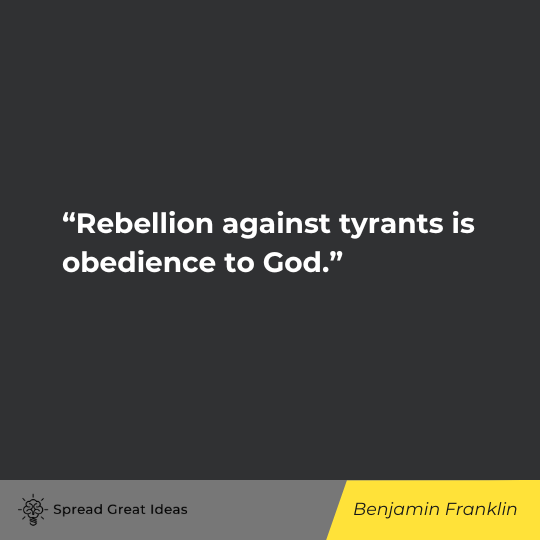Table of Contents
Civil disobedience is a spark for change, a refusal to accept injustice as the norm. These quotes will challenge you to stand up, speak out, and resist with purpose.
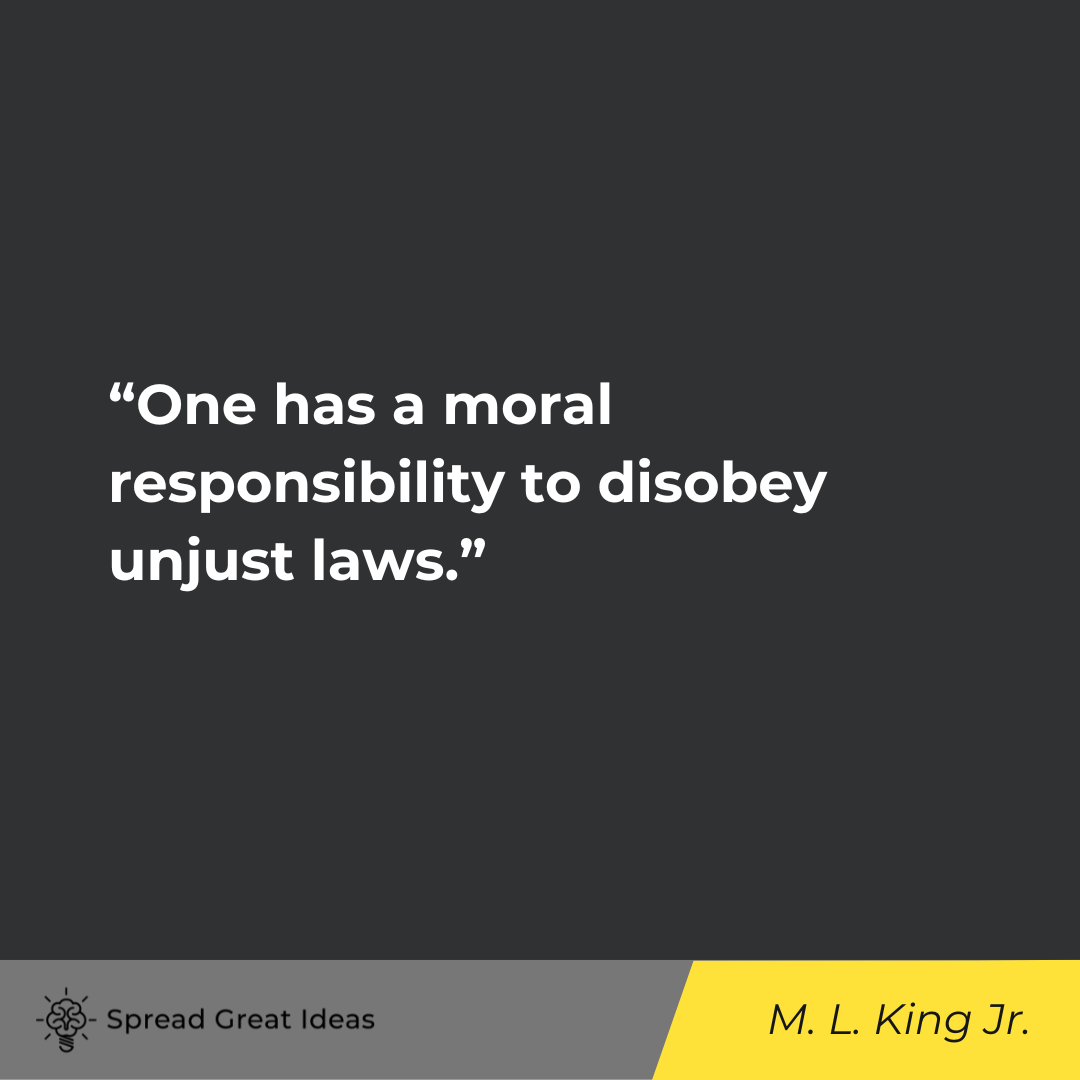
Civil disobedience isn’t about chaos. It’s about conscience. It’s the act of standing firm when the rules are wrong, of saying no when silence would mean complicity.
I’ve pulled together quotes from bold thinkers and brave souls who challenged injustice, questioned authority, and sparked change by refusing to just go along.
G.K. Chesterton
“A man who says that no patriot should attack the Boer War until it is over is not worth answering intelligently; he is saying that no good son should warn his mother off a cliff until she has fallen over it.”

Johann Wolfgang von Goethe
“When a nation which has long groaned under the intolerable yoke of a tyrant rises at last and throws off its chains, do you call that weakness? The man who, to rescue his house from the flames, finds his physical strength redoubled, so that he lifts burdens with ease which in the absence of excitement he could scarcely move; he who under the rage of an insult attacks and puts to flight half a score of his enemies,—are such persons to be called weak? My good friend, if resistance be strength, how can the highest degree of resistance be a weakness?”
– Johann Wolfgang von Goethe, The Sorrows of Young Werther
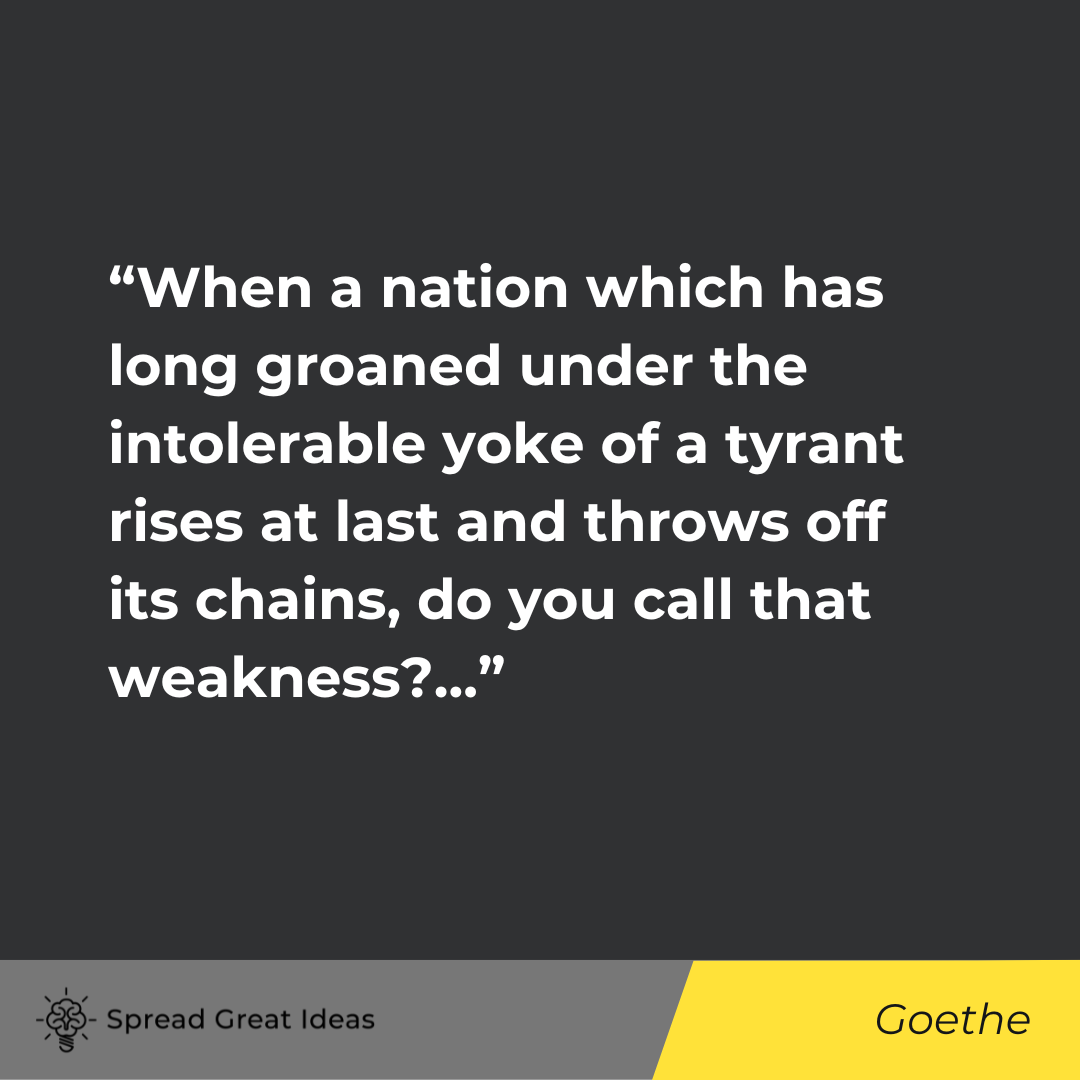
Thomas Jefferson
“Experience has shown that even under the best forms, those entrusted with power have, in time, and by slow operations, perverted it into tyranny; and it is believed that the most effectual means of preventing this is to illuminate the minds of the people at large, possessed with the knowledge of other ages and countries so that they may be enabled to know ambition under all its shapes and promptly exert their natural powers to defeat it.”
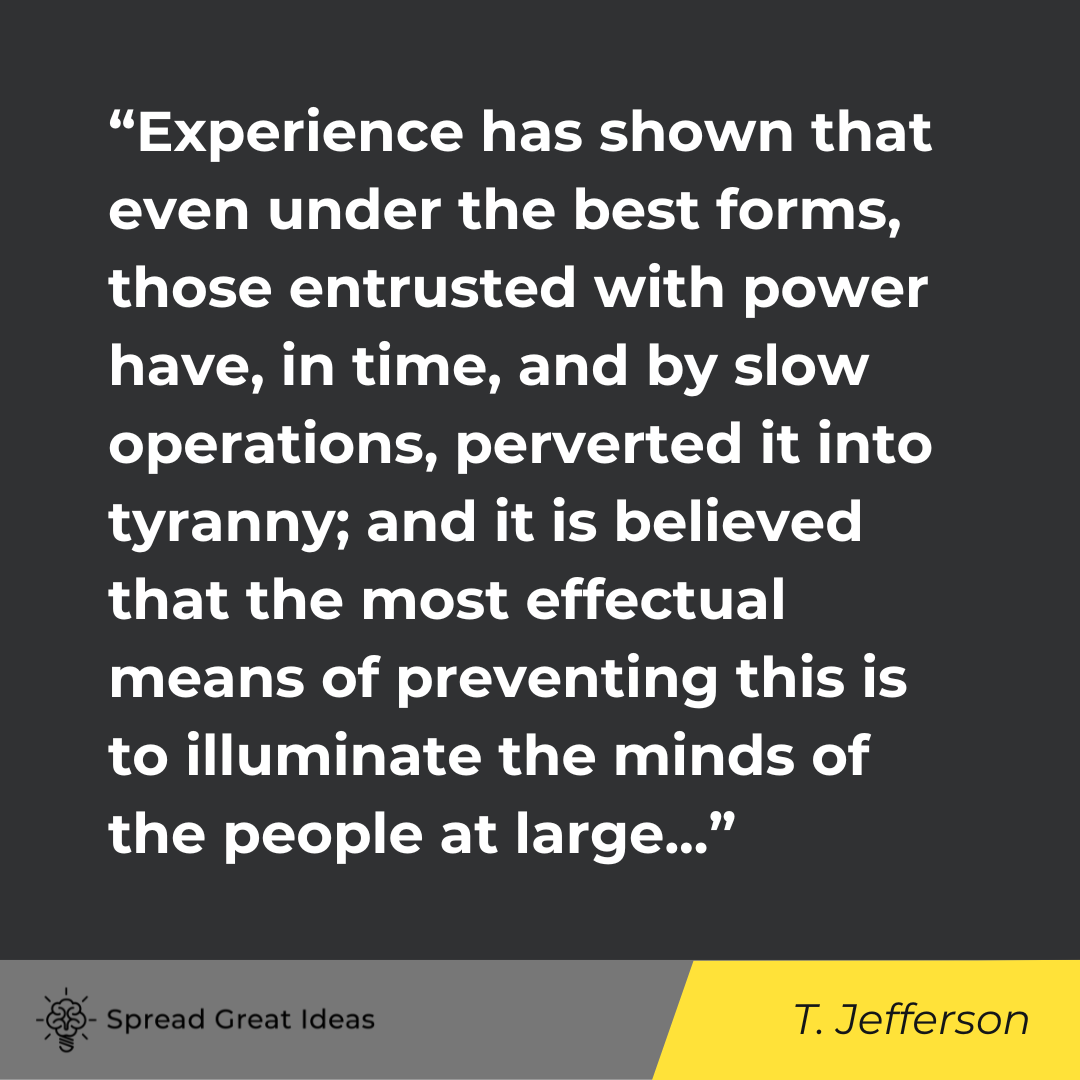
“The spirit of resistance to government is so valuable on certain occasions, that I wish it to be always kept alive.”
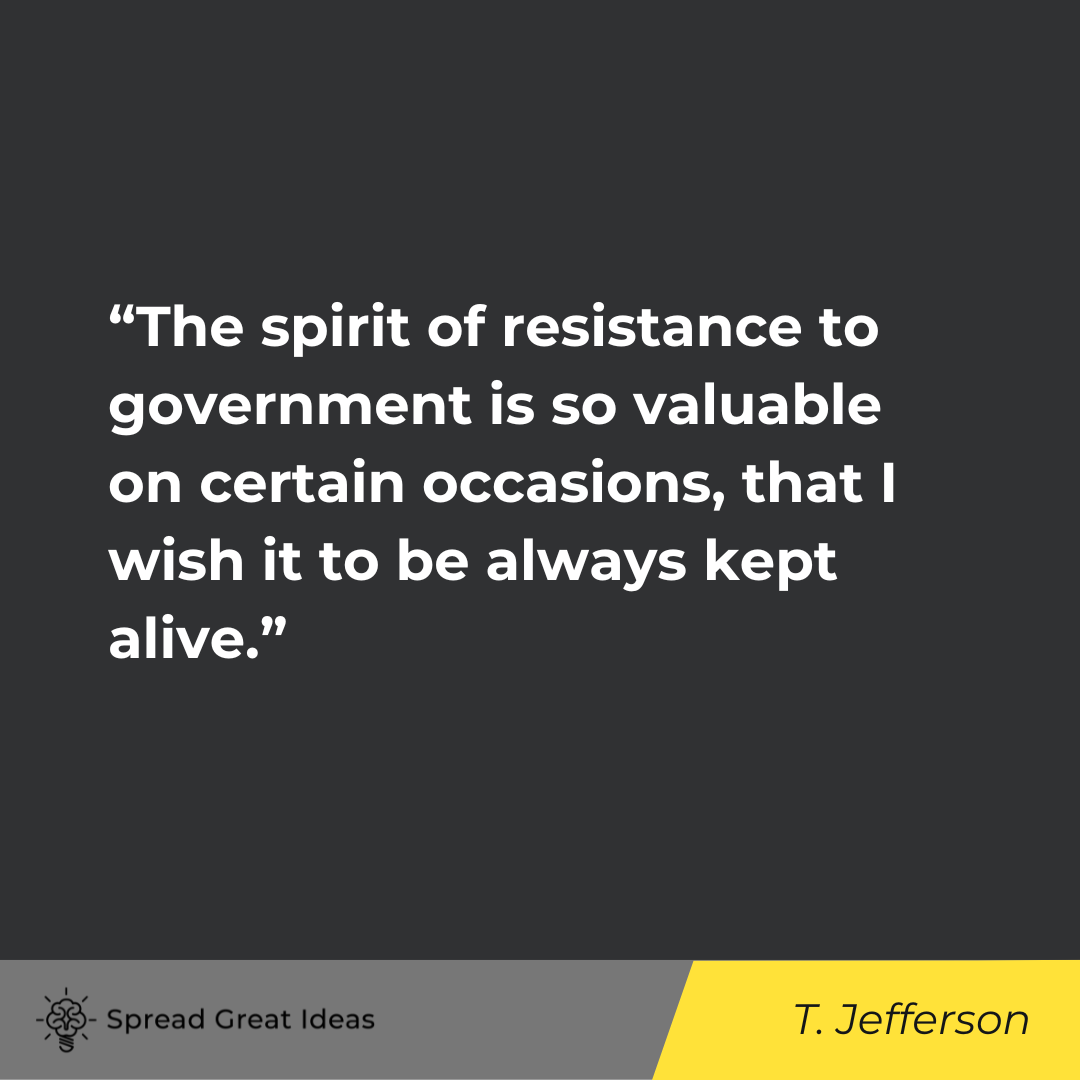
Martin Luther King Jr.
“My friends, I must say to you that we have not made a single gain in civil rights without determined legal and nonviolent pressure. Lamentably, it is an historical fact that privileged groups seldom give up their privileges voluntarily. Individuals may see the moral light and voluntarily give up their unjust posture; but, as Reinhold Niebuhr has reminded us, groups tend to be more immoral than individuals.”
– Martin Luther King Jr., “Letter from a Birmingham Jail“
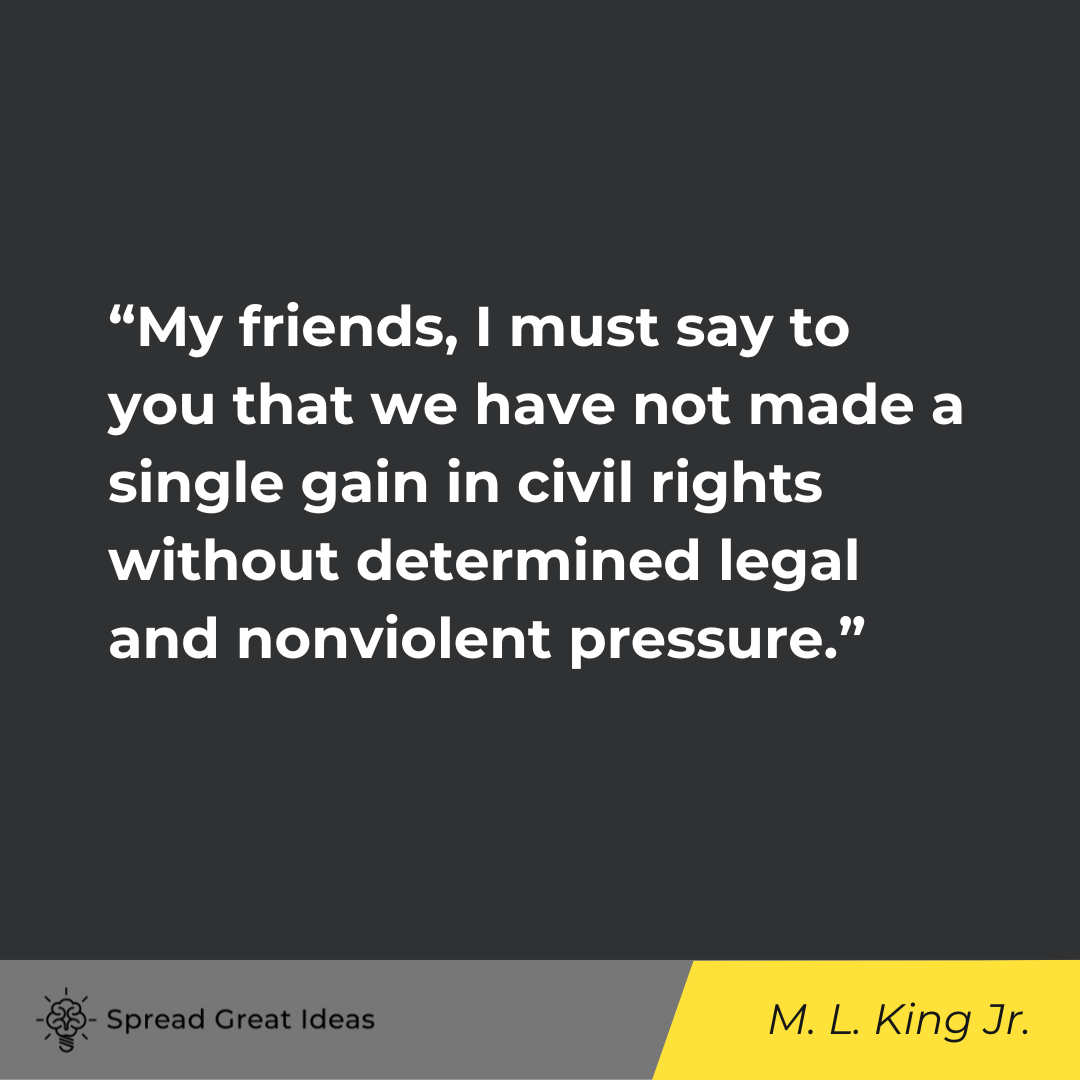
“One has a moral responsibility to disobey unjust laws.”
John Adams
“Resistance to sudden violence, for the preservation not only of my person, my limbs, and life, but of my property, is an indisputable right of nature which I have never surrendered to the public by the compact of society, and which perhaps, I could not surrender if I would.”
– John Adams, Boston Gazette, September 5, 1763
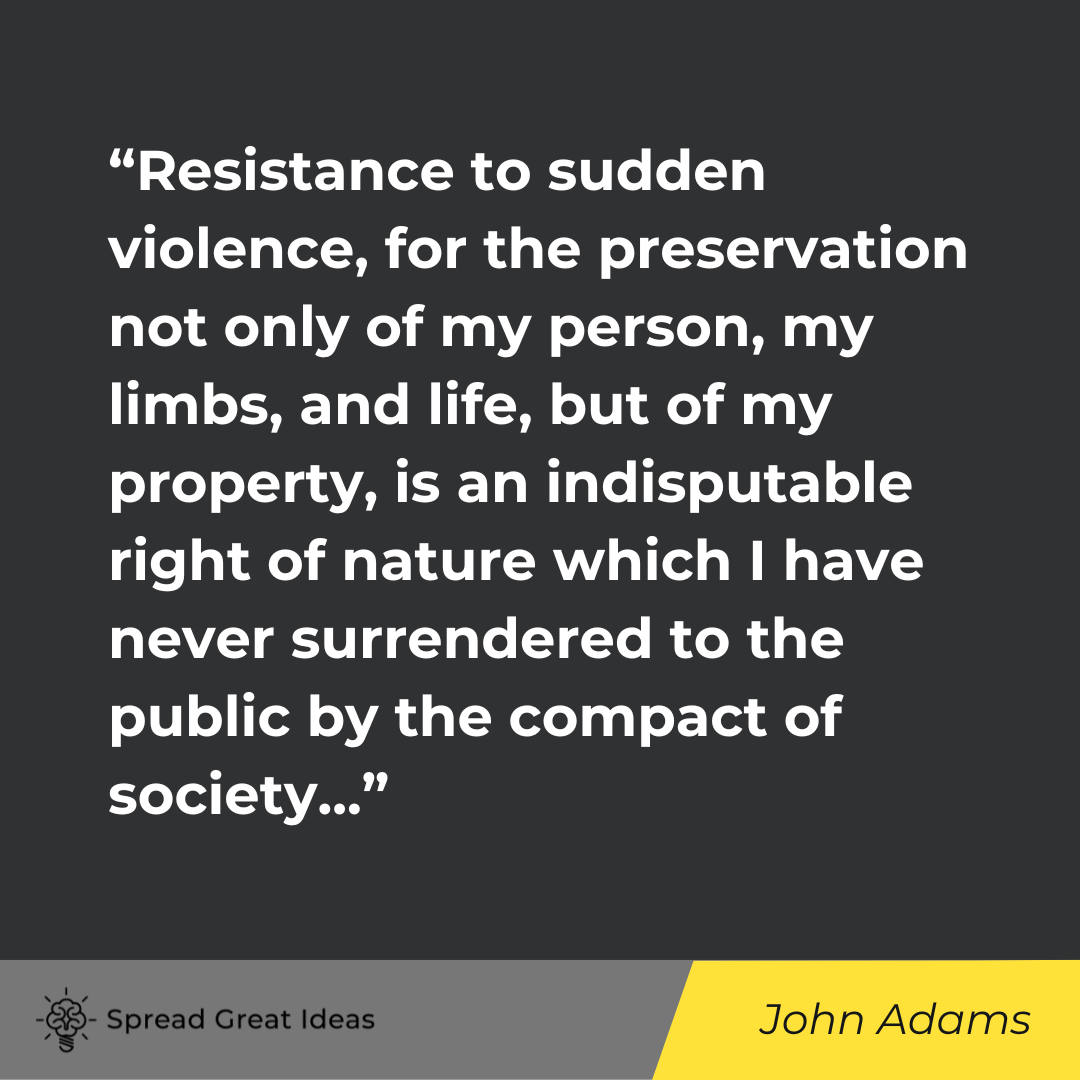
Hubert H. Humphrey
“Certainly one of the chief guarantees of freedom under any government, no matter how popular and respected, is the right of the citizens to keep and bear arms… The right of the citizens to bear arms is just one guarantee against arbitrary government and one more safeguard against a tyranny which now appears remote in America, but which historically has proved to be always possible.”
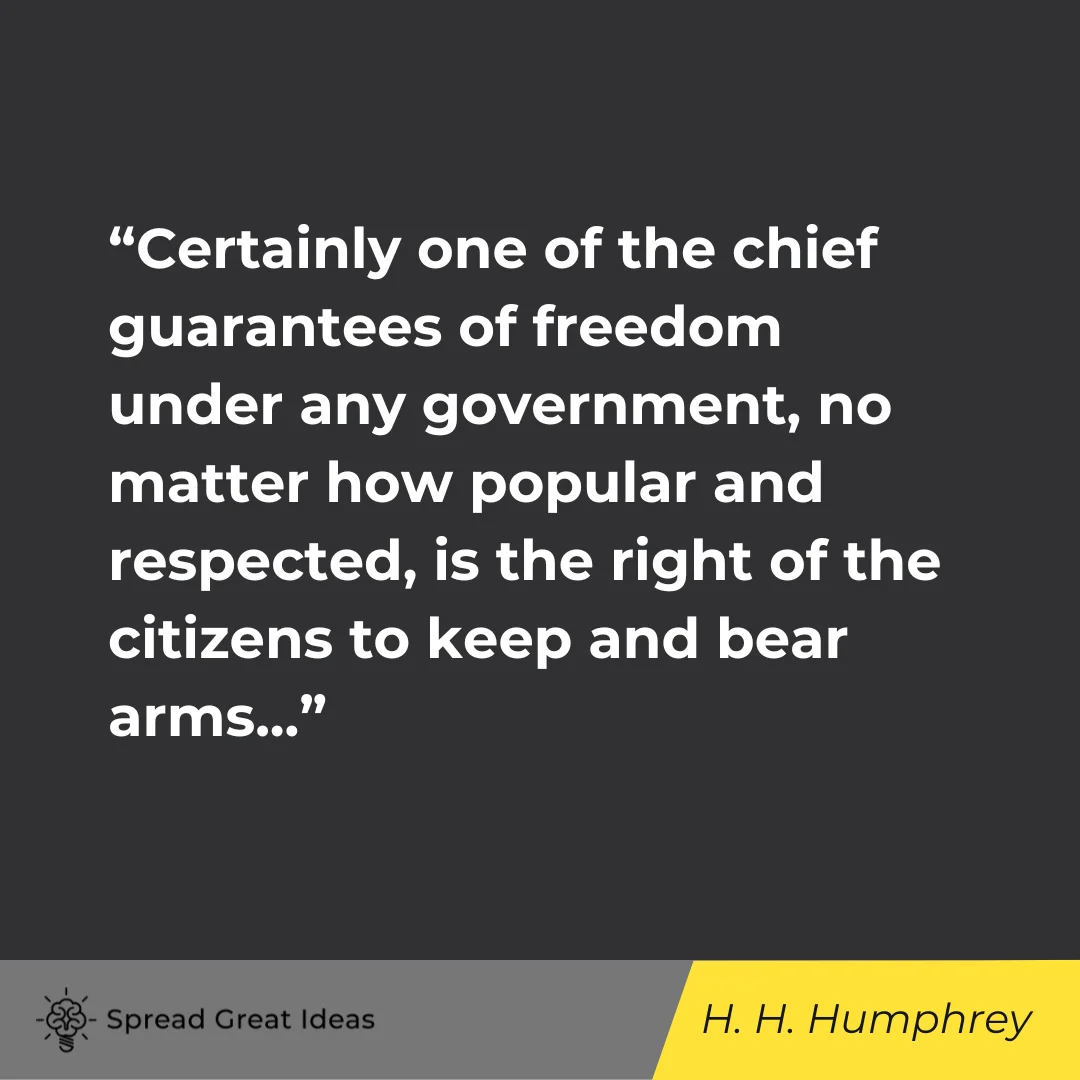
Abraham Lincoln
“This country belongs to the people and whenever they shall grow weary of their government they can exercise their constitutional right to amend it, or revolutionary right to dismember it or overthrow it.”
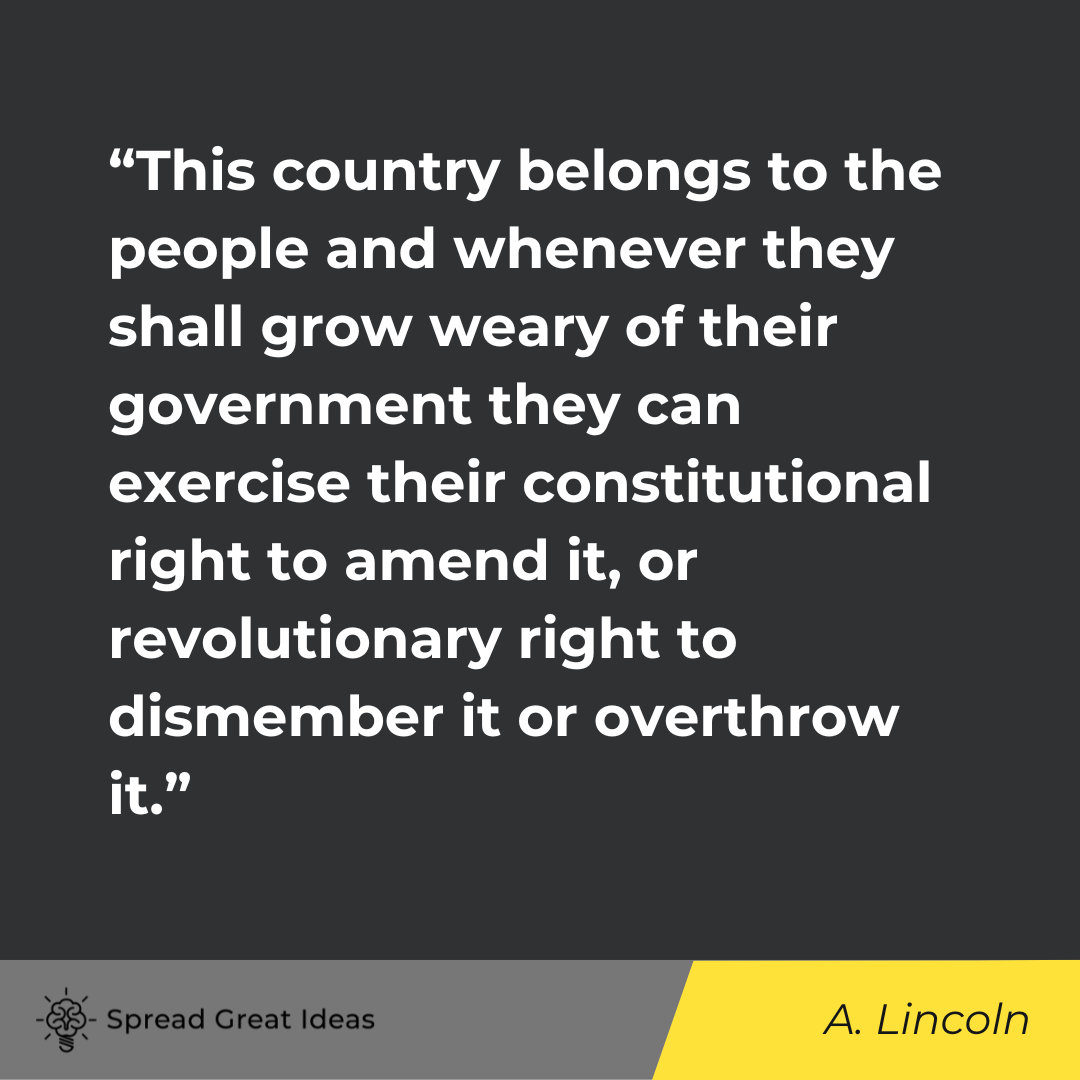
Henry David Thoreau
“I heartily accept the motto, ‘That government is best which governs least’; and I should like to see it acted up to more rapidly and systematically. Carried out, it finally amounts to this, which also I believe – ‘That government is best which governs not at all’; and when men are prepared for it, that will be the kind of government which they will have.”
– Henry David Thoreau, Civil Disobedience
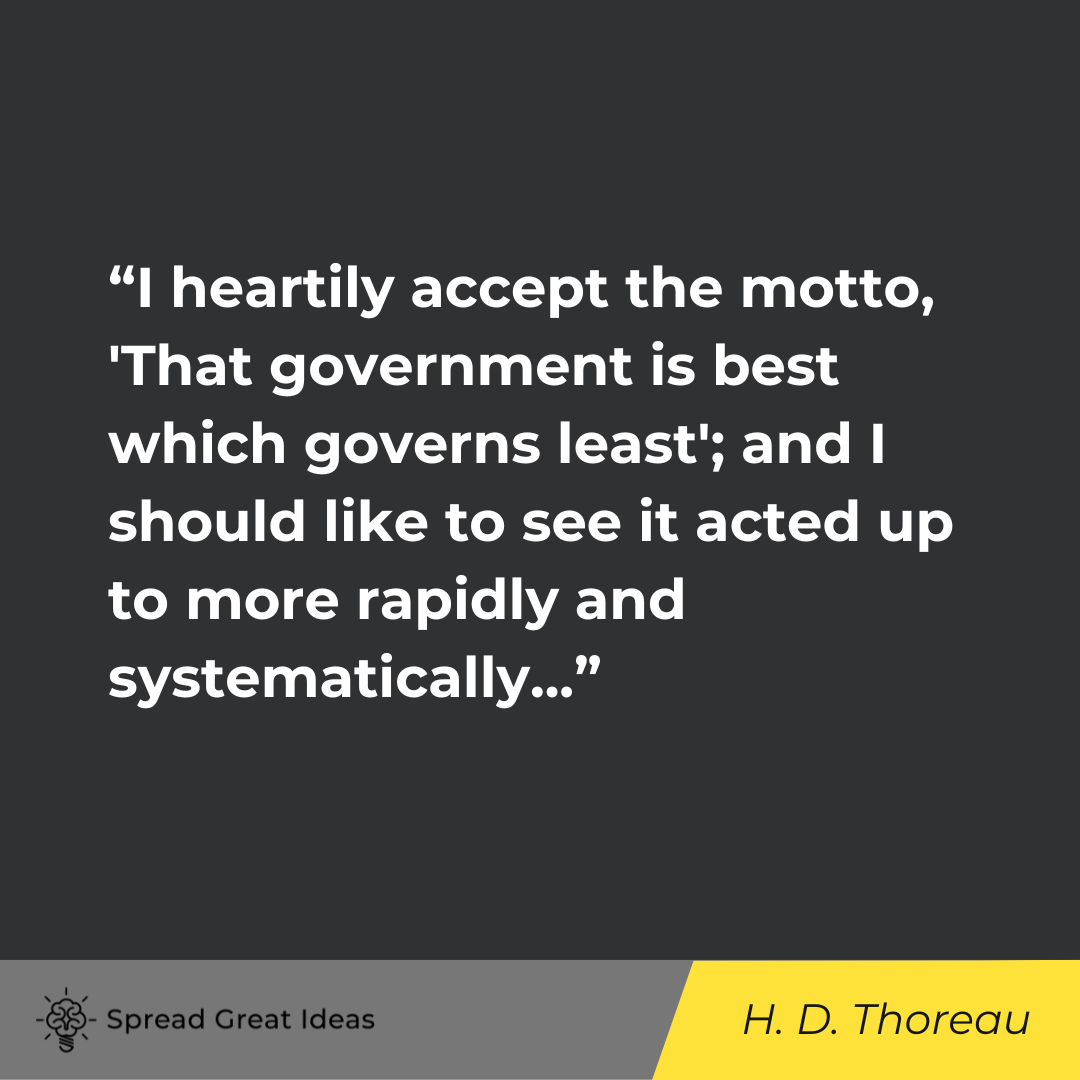
“In an unjust society the only place for a just man is prison.”
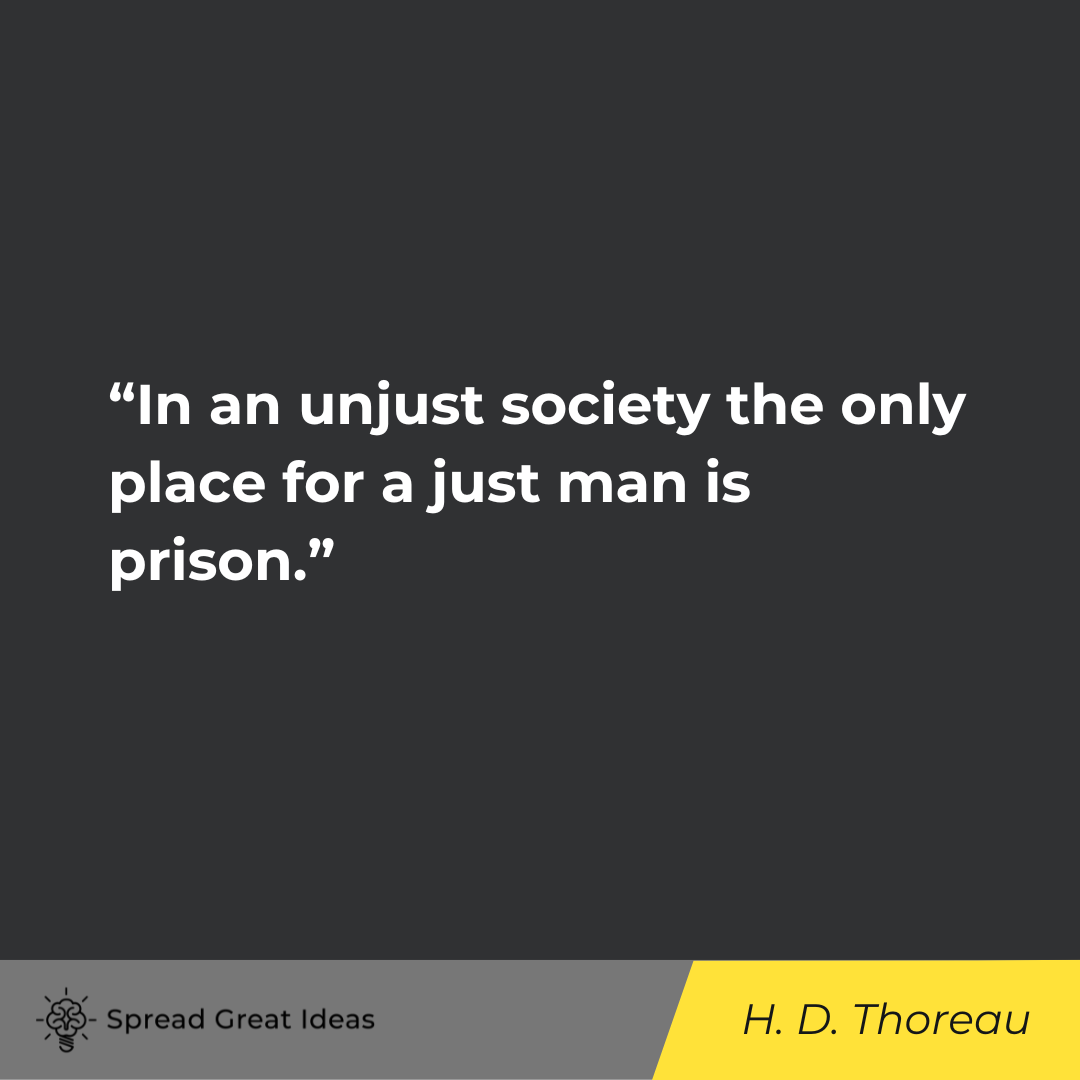
“If the injustice is part of the necessary friction of the machine of government, let it go, let it go; perchance it will wear smooth – certainly the machine will wear out. If the injustice has a spring, or a pulley, or a rope, or a crank, exclusively for itself, then perhaps you may consider whether the remedy will not be worse than the evil; but if it is of such a nature that it requires you to be the agent of injustice to another, then, I say, break the law. Let your life be a counter friction to stop the machine.”
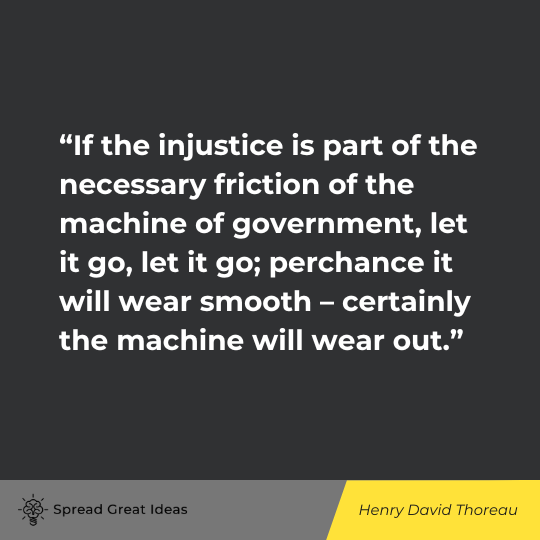
“Must the citizen ever for a moment, or in the least degree, resign his conscience to the legislator? Why has every man a conscience, then? I think that we should be men first, and subjects afterward.”
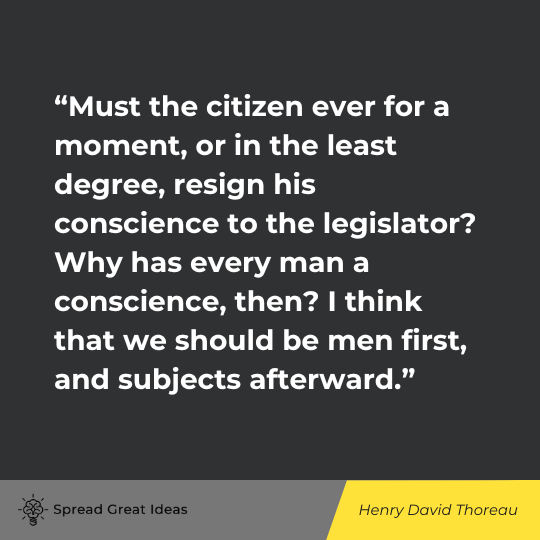
“A minority is powerless while it conforms to the majority; it is not even a minority then; but it is irresistible when it clogs by its whole weight.”
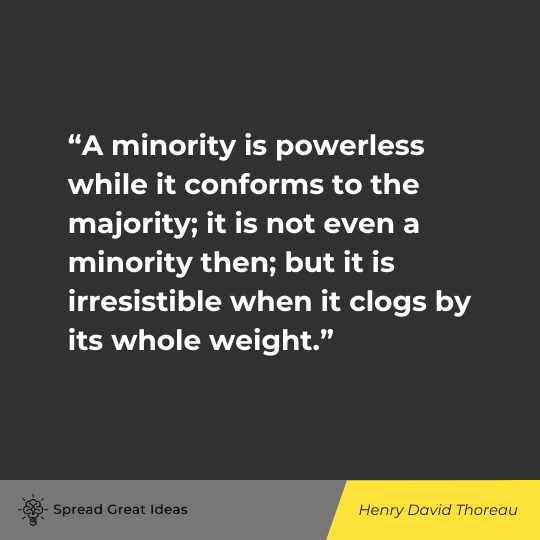
“Our legislators have not yet learned the comparative value of free-trade and of freedom, of union, and of rectitude, to a nation. They have no genius or talent for comparatively humble questions of taxation and finance, commerce and manufactures and agriculture. If we were left solely to the wordy wit of legislators in Congress for our guidance, uncorrected by the seasonable experience and the effectual complaints of the people, America would not long retain her rank among the nations.”
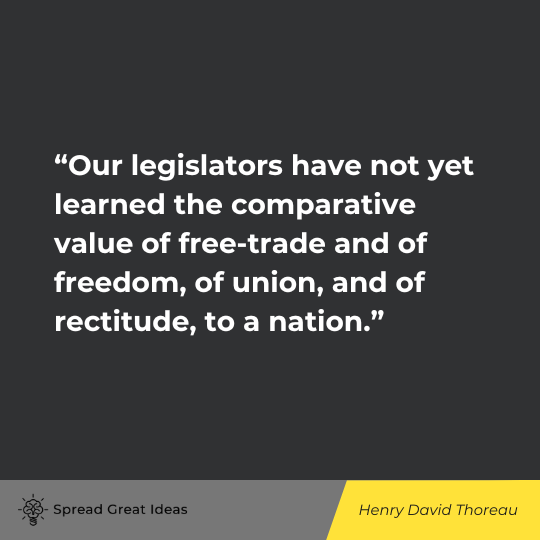
“I was not born to be forced. I will breathe after my own fashion. Let us see who is the strongest.”
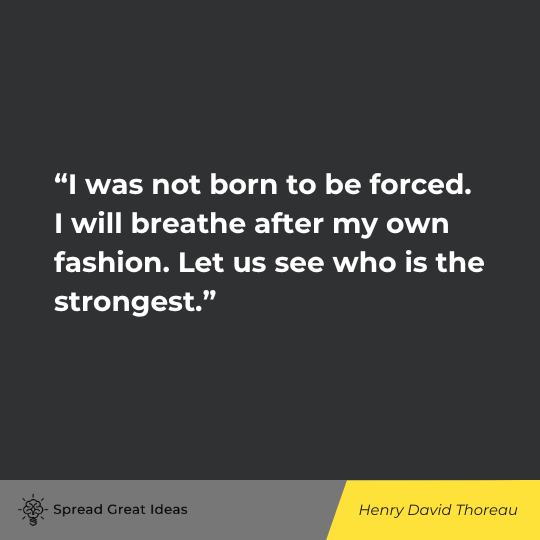
Aristotle
“It is not always the same thing to be a good man and a good citizen.”
― Aristotle, Nicomachean Ethics and Politics
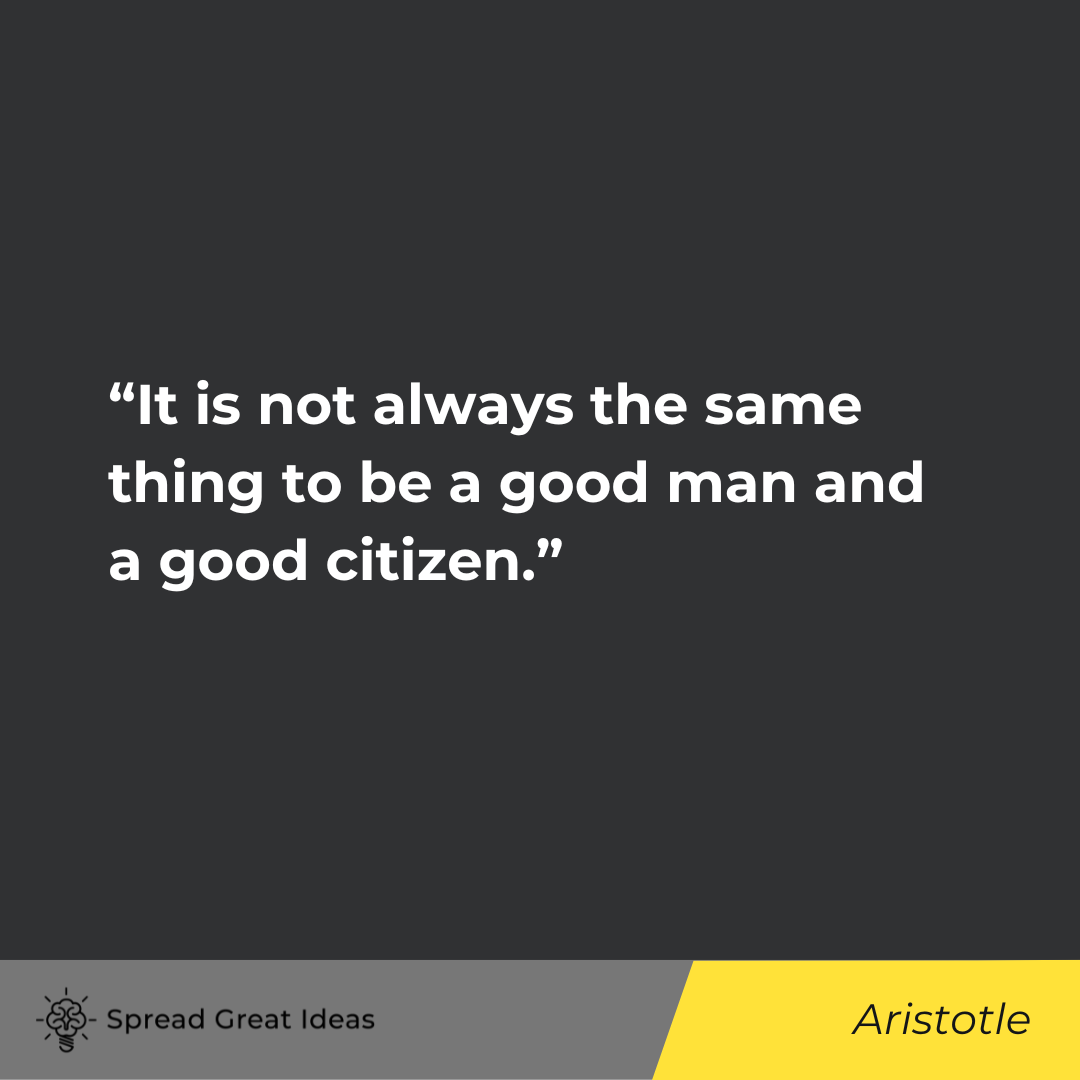
Mahatma Gandhi
“An unjust law is itself a species of violence. Arrest for its breach is more so.”
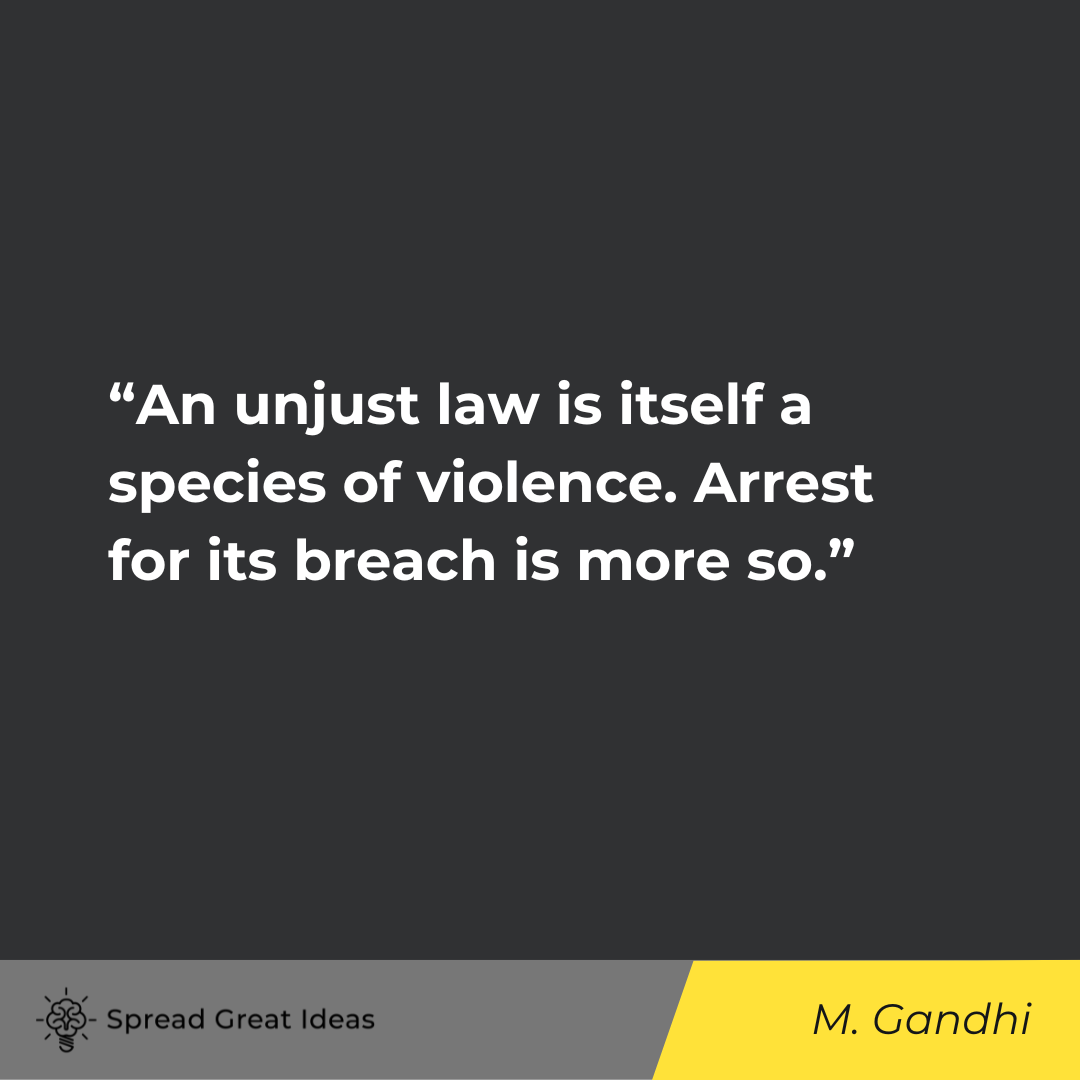
Elie Wiesel
“There may be times when we are powerless to prevent injustice, but there must never be a time when we fail to protest.”
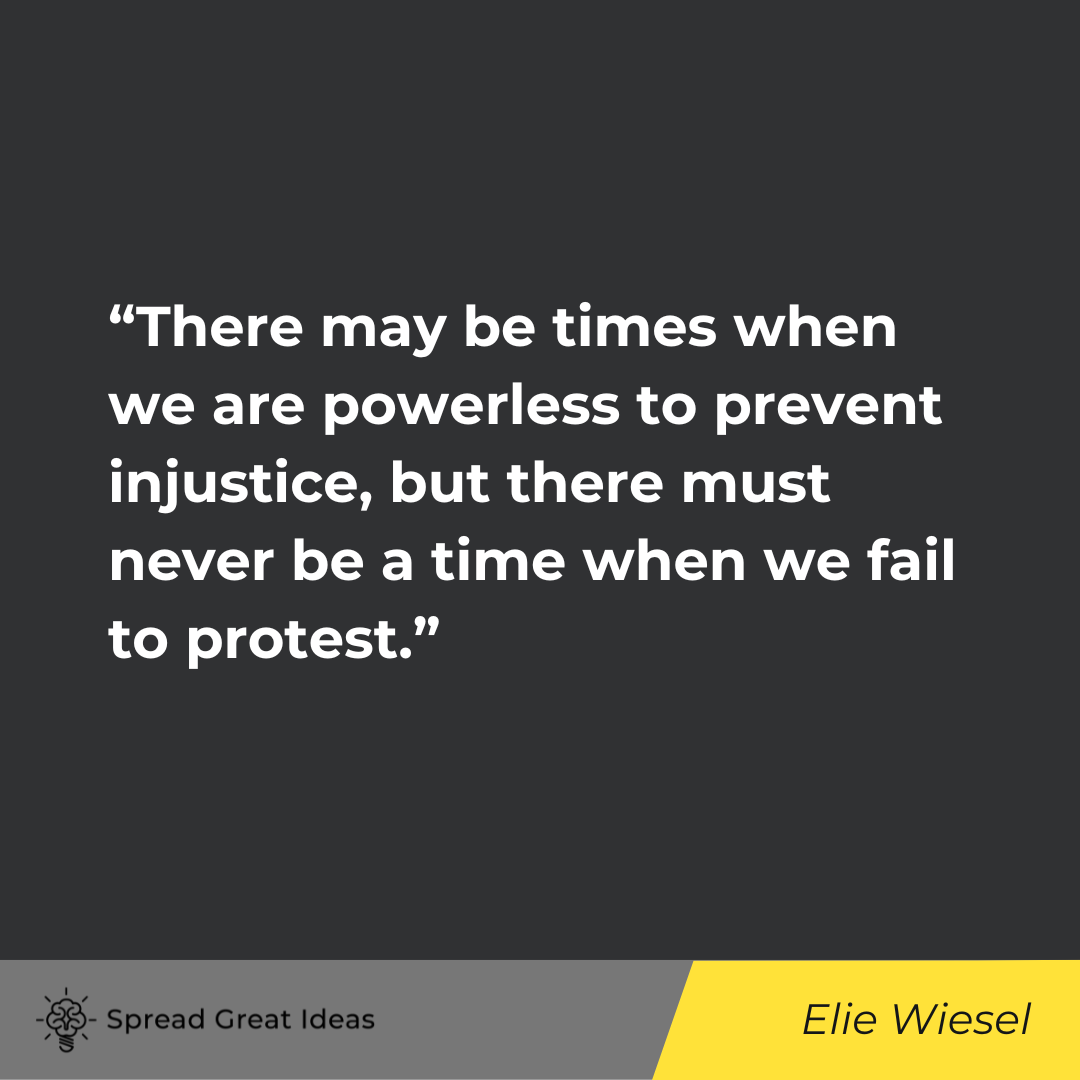
Albert Einstein
“Never do anything against conscience even if the state demands it.”
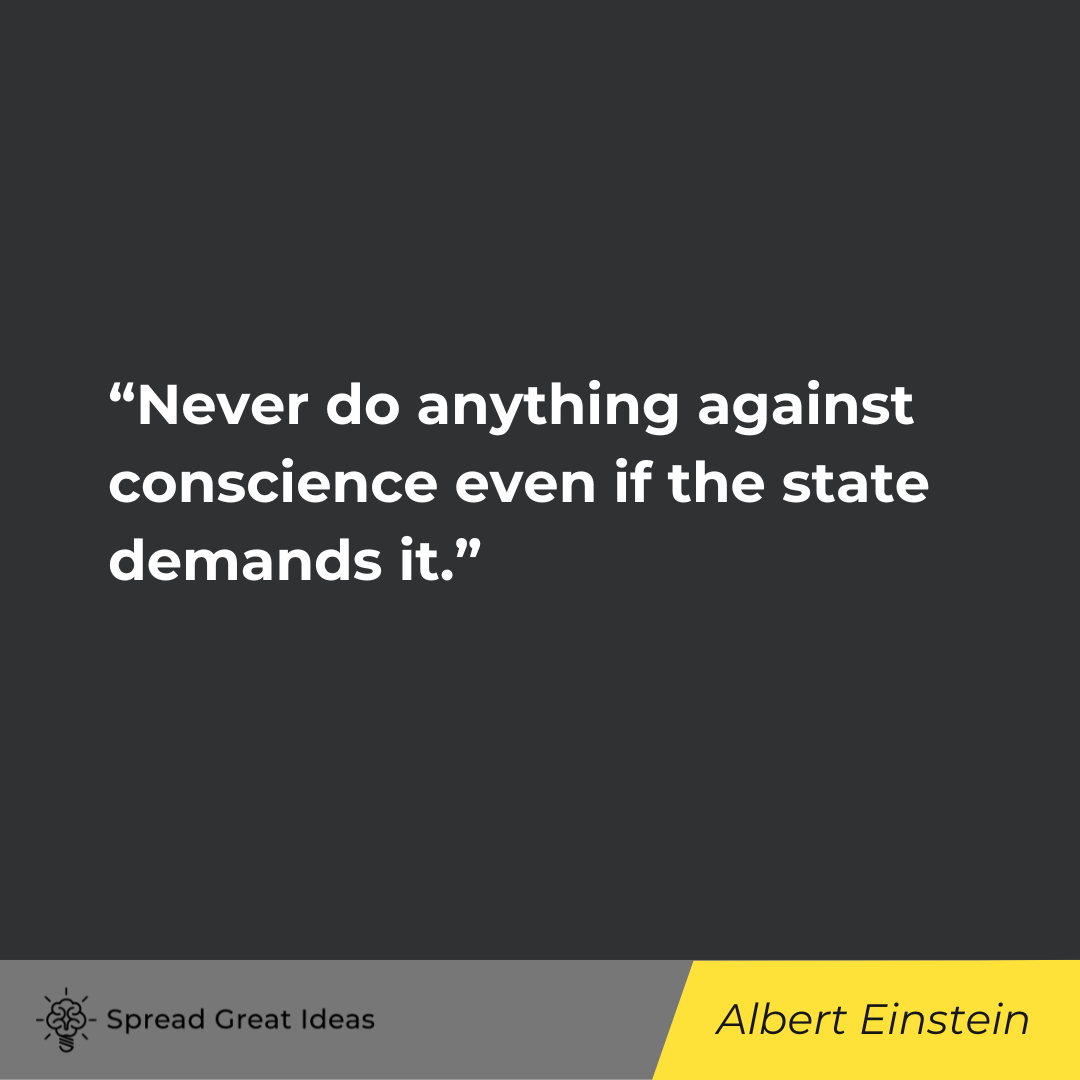
“Unthinking respect for authority is the greatest enemy of truth.”
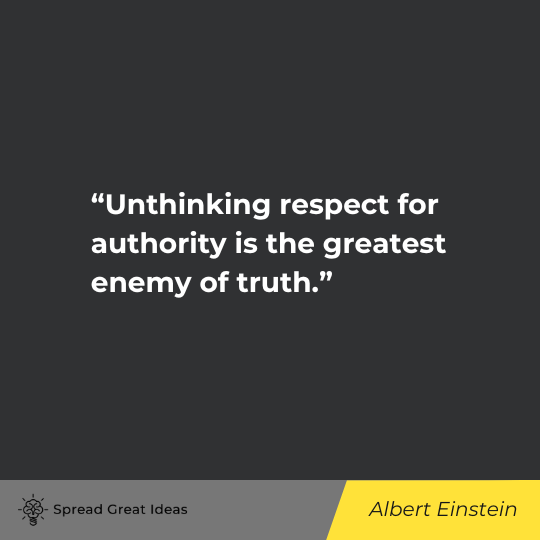
Bertrand Russell
“The time has come, or is about to come, when only large-scale civil disobedience, which should be nonviolent, can save the populations from the universal death which their governments are preparing for them.”
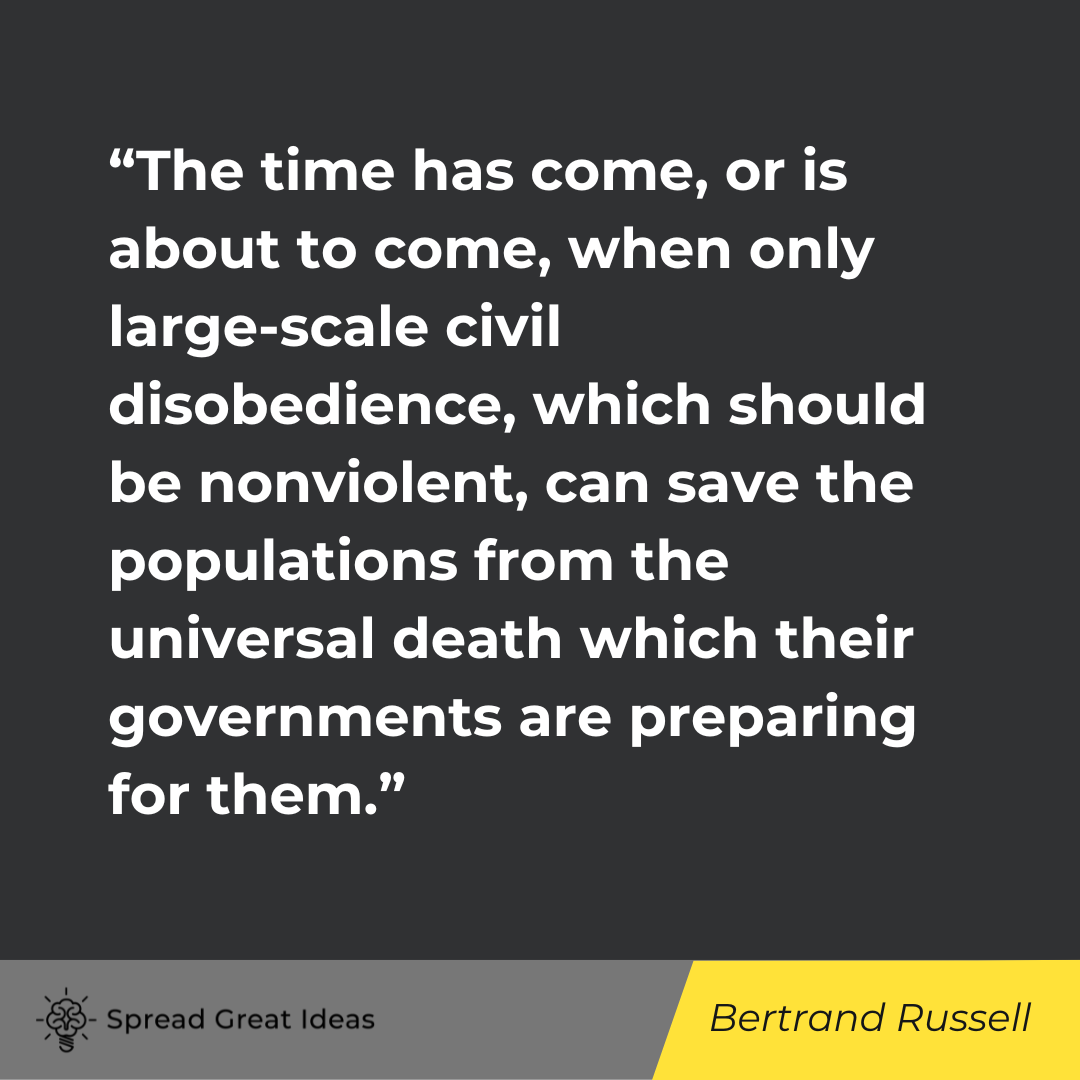
Antonio Negri
“Disobedience to authority is one of the most natural and healthy acts.”
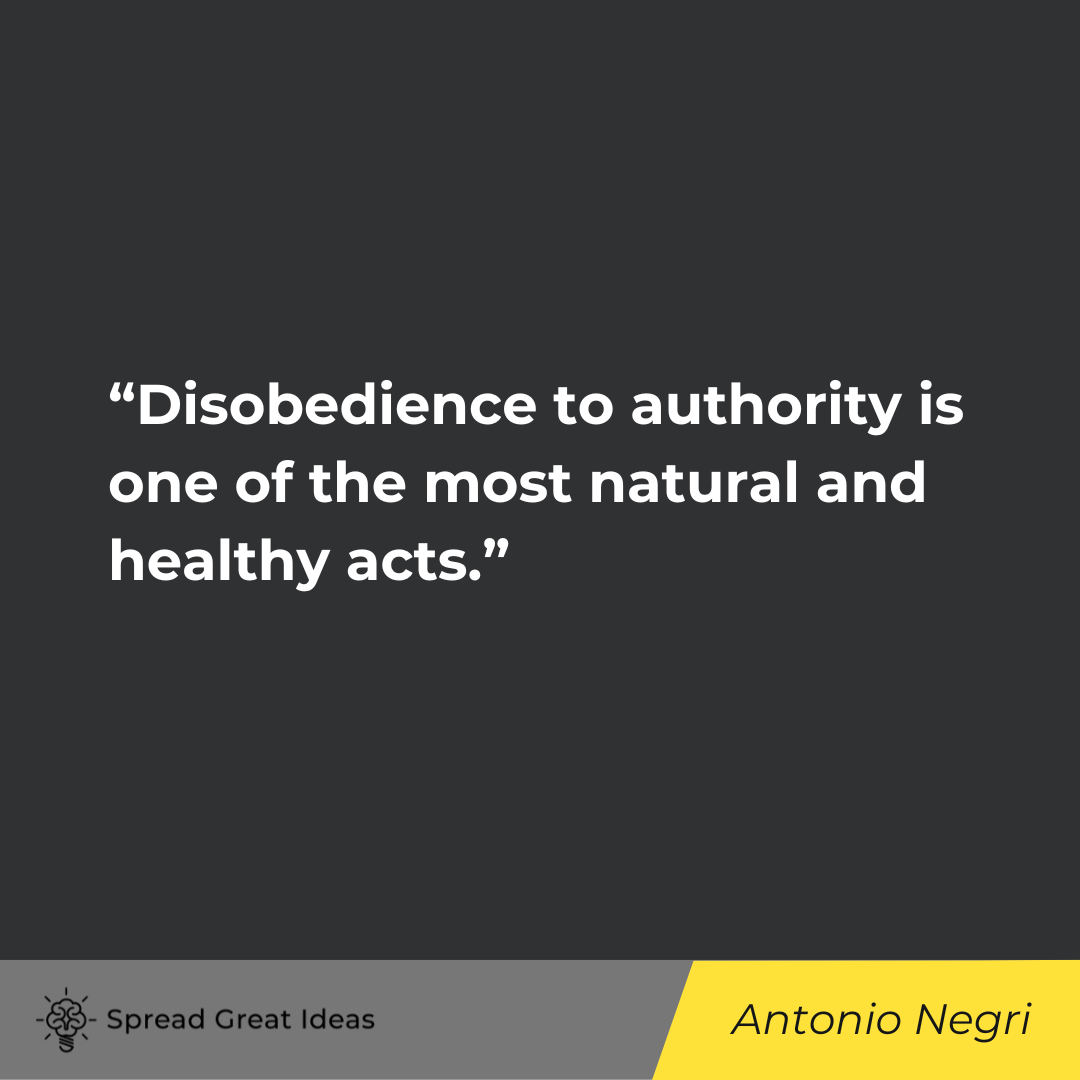
Benjamin Franklin
“Rebellion against tyrants is obedience to God.”
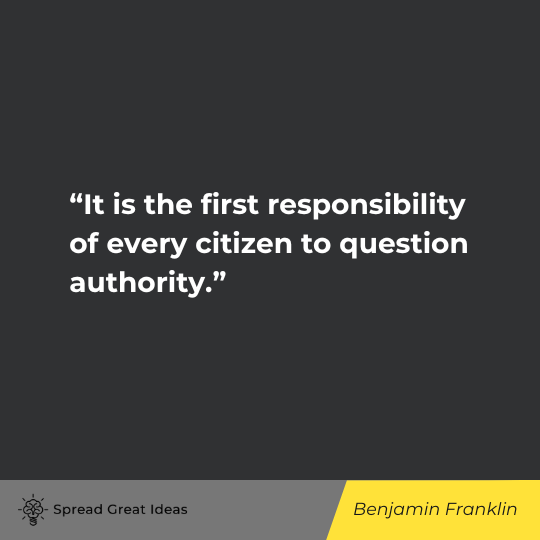
Juvenal
“Dare to do things worthy of imprisonment if you mean to be of consequence.”
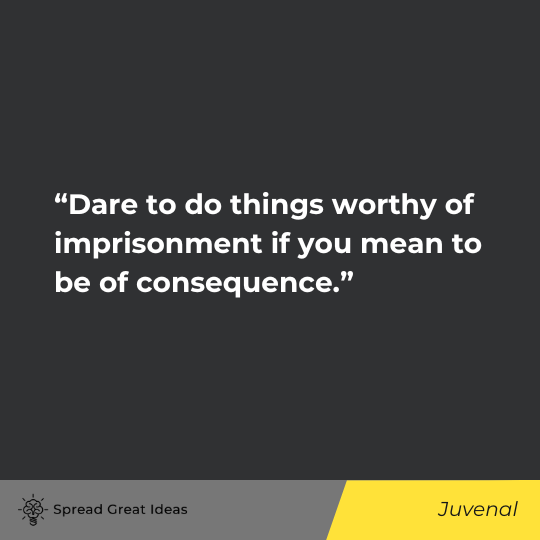
Pastor Butch Paugh
“When evil men make bad laws, righteous men disobey them.”
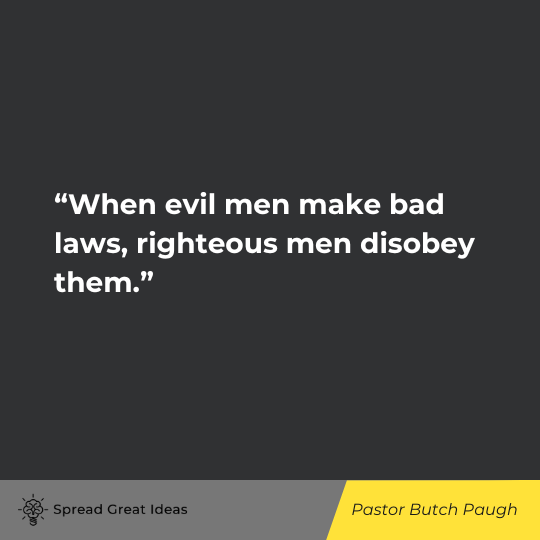
Ella Wheeler Wilcox
“To sin by silence, when we should protest,
Makes cowards out of men. The human race
Has climbed on protest. Had no voice been raised
Against injustice, ignorance, and lust,
The inquisition yet would serve the law,
And guillotines decide our least disputes.”
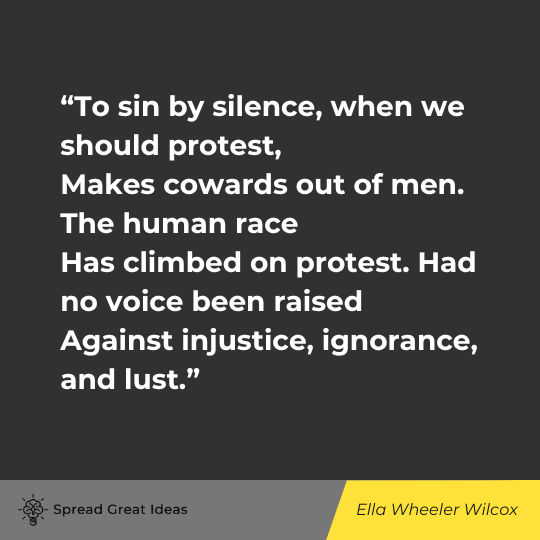
John Stuart Mill
“Let not any one pacify his conscience by the delusion that he can do no harm if he takes no part, and forms no opinion. Bad men need nothing more to compass their ends, than that good men should look on and do nothing. He is not a good man who, without a protest, allows wrong to be committed in his name, and with the means which he helps to supply, because he will not trouble himself to use his mind on the subject.”
– John Stuart Mill, University of St. Andrews 1867 inaugural address
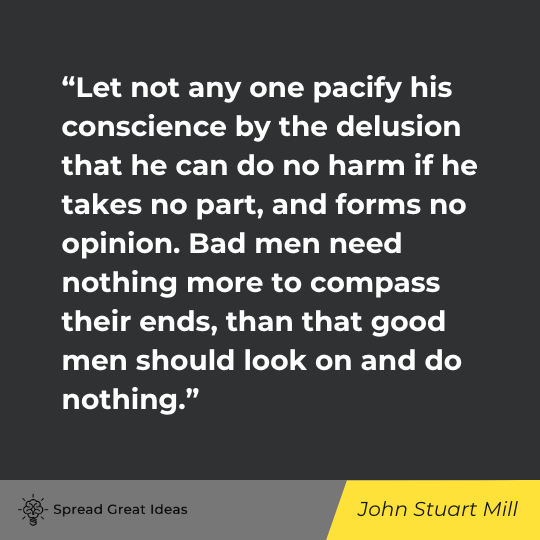
Robert Heinlein
“I am free, no matter what rules surround me. If I find them tolerable, I tolerate them; if I find them too obnoxious, I break them. I am free because I know that I alone am morally responsible for everything I do.”
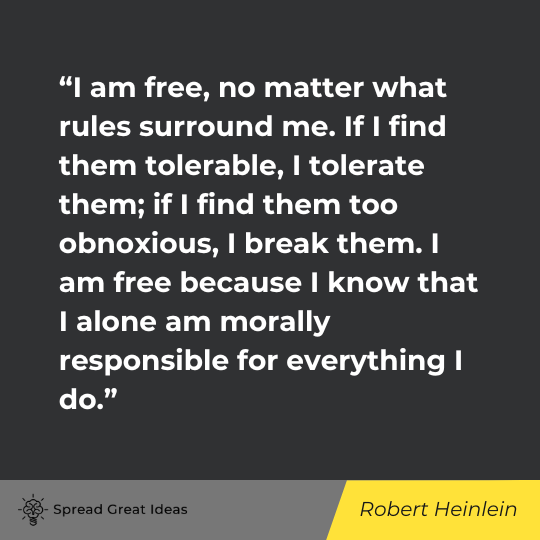
Dennis Kreiss
“Only the truly evil do not believe in civil disobedience under any circumstance. If you refuse to disobey when the government demands that you commit atrocities, you are devoid of values. Every man with a conscience has some line in the sand over which the Government may not pass!”
– Dennis Kreiss, Survival Guide: Living Boldly in Trying Times
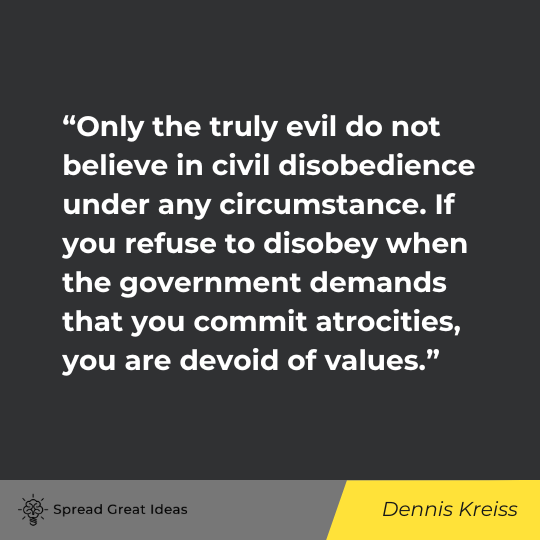
Algernon Sydney
“That which is not just, is not Law; and that which is not Law, ought not to be obeyed.”
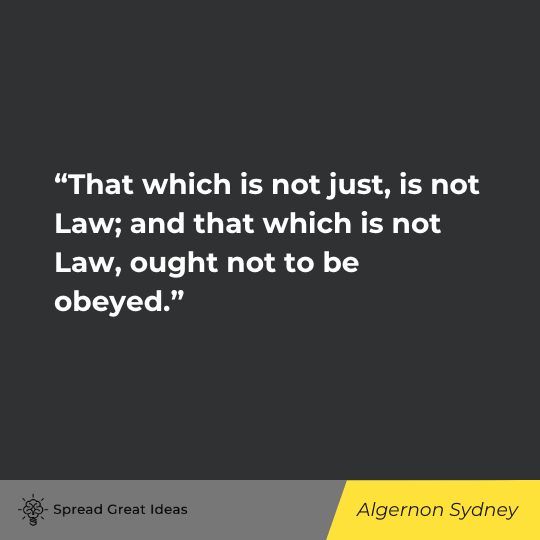
Mehmet Murat İldan
“A dog can bite you but you must not bite the dog! Your every movement in life must be peaceful; otherwise you lose your ethical superiority! Nonviolent civil disobedience is a genius; no power can beat it; use it when necessary!”
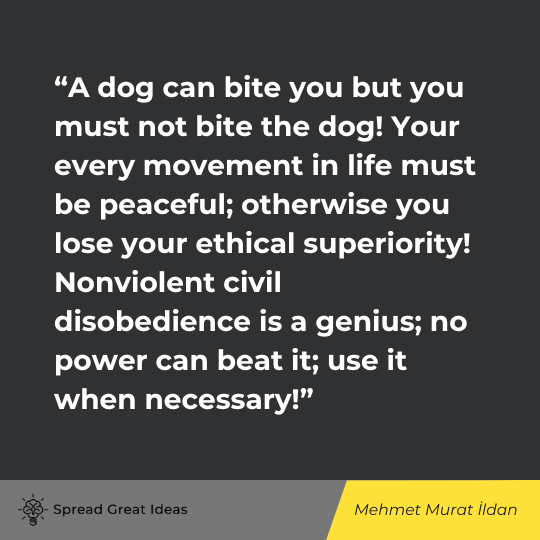
Ayn Rand
“Politically, mass civil disobedience is appropriate only as a prelude to civil war – as the declaration of a total break with a country’s political institutions.”
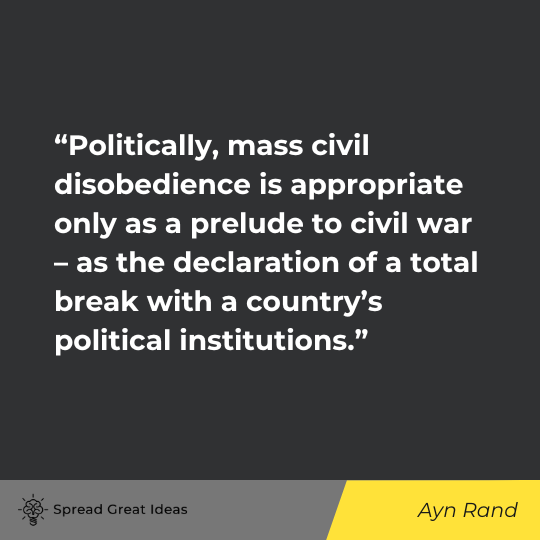
Robert Frost
“Far more violence has been done in obeying the law than in breaking the law.”
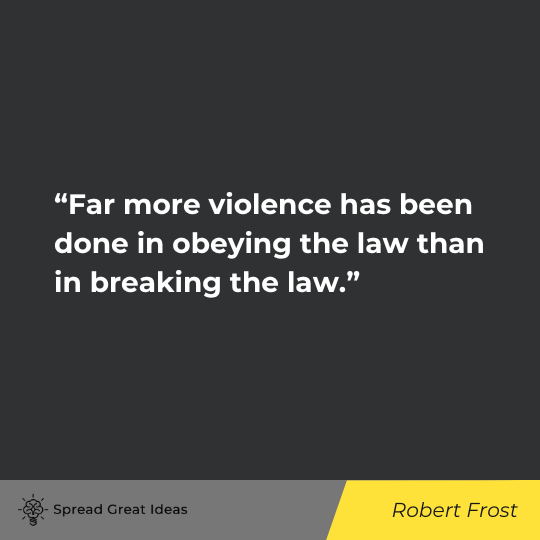
Howard Zinn
“Our problem is civil obedience. Our problem is the numbers of people all over the world who have obeyed the dictates of the leaders of their government and have gone to war, and millions have been killed because of this obedience.”
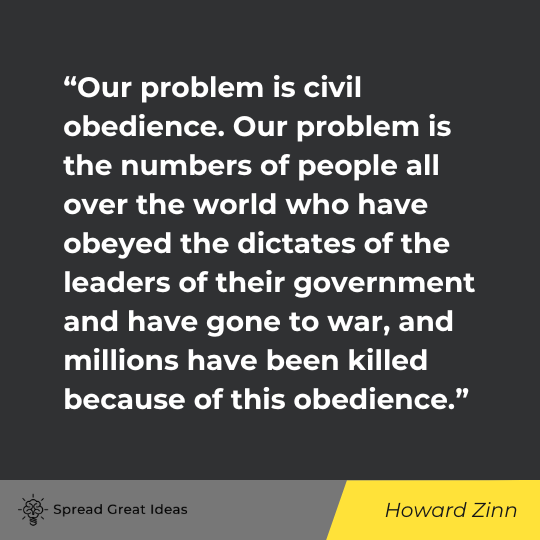
“This spirit is resistance to illegitimate authority and to forces that deprive people of their life and liberty and right to pursue happiness, and therefore under these conditions, it urges the right to alter or abolish their current form of government – and the stress had been on abolish. But to establish the principles of the Declaration of Independence, we are going to need to go outside the law, to stop obeying the laws that demand killing or that allocate wealth the way it has been done, or that put people in jail for petty technical offenses and keep other people out of jail for enormous crimes.”
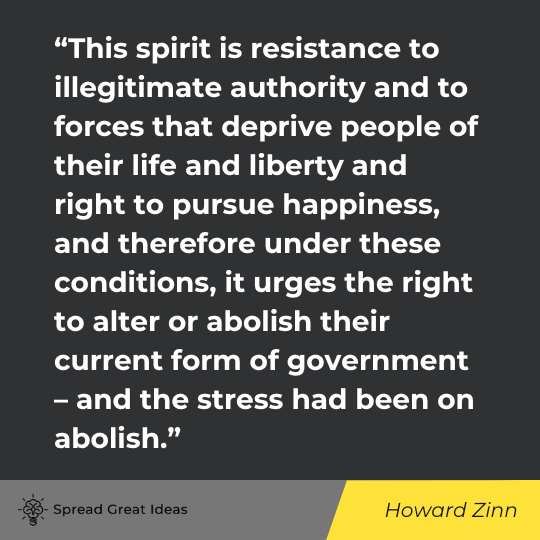
Erich Fromm
“Human history begins with man’s act of disobedience, which is at the very same time the beginning of his freedom and development of his reason.”
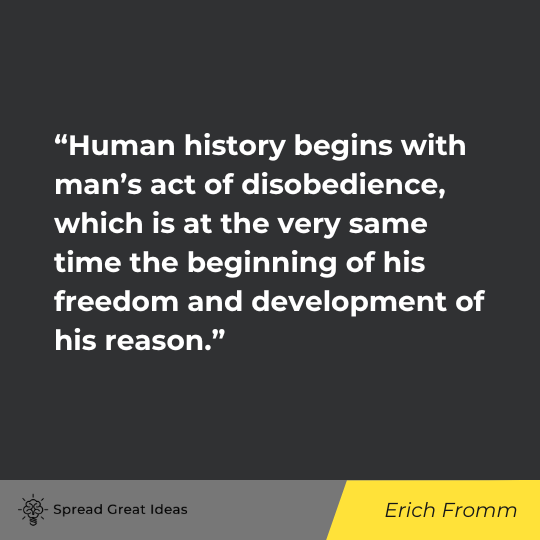
Mark Twain
“Each man must for himself alone decide what is right and what is wrong, which course is patriotic and which isn’t. You cannot shirk this and be a man. To decide against your conviction is to be an unqualified and excusable traitor, both to yourself and to your country, let men label you as they may.”
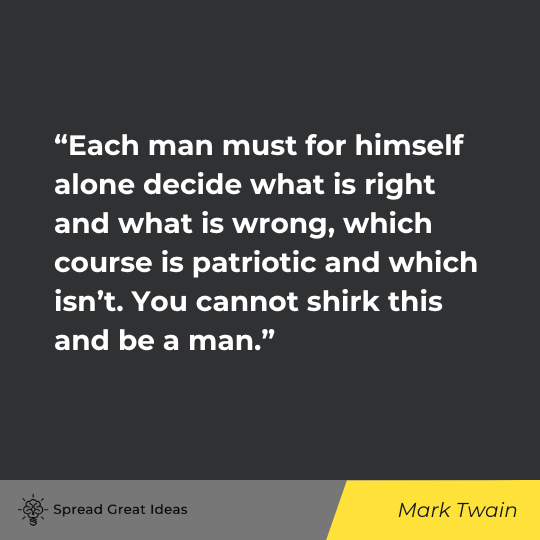
Edmund Burke
“As long as the world shall last there will be wrongs, and if no man objected and no man rebelled, those wrongs would last forever.”
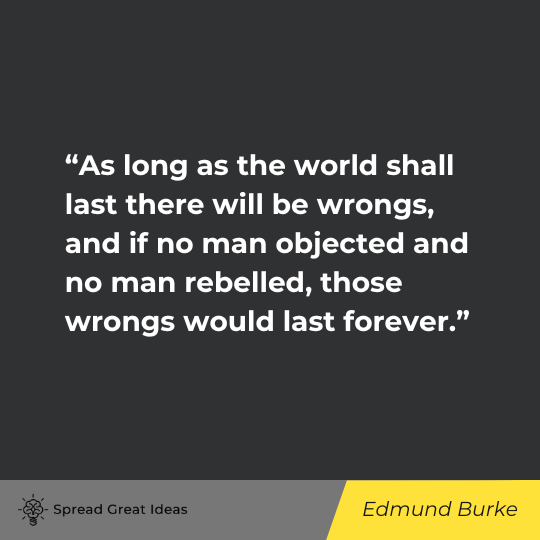
“It is not what a lawyer tells me I may do; but what humanity, reason, and justice tell me I ought to do.”
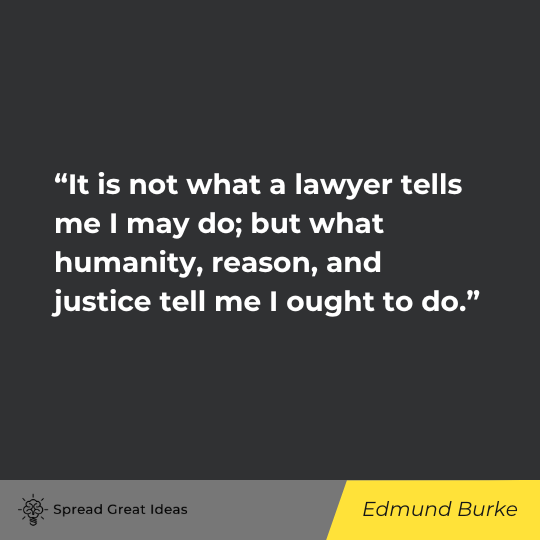
Wow! That was a lot of civil disobedience quotes! If you made it this far, then you deserve one more piece of advice about civil disobedience: Pouring milk all over your face after you get pepper sprayed doesn’t actually do anything. It just wastes milk, and there’s never an ethical justification for that.
